Essay on Denunciation as a Necessary Part of Society - MLL319 Law
VerifiedAdded on 2023/06/13
|10
|2685
|153
Essay
AI Summary
This essay discusses denunciation as a valid sentencing objective within the framework of criminal law, particularly concerning its role in expressing community disapproval even when other sentencing objectives are not met. The essay references the Crimes (Sentencing Procedure) Act 1999, emphasizing section 3A, which outlines the purposes of sentencing, including individual deterrence, rehabilitation, incapacitation, and denunciation. It highlights the importance of denunciation in reinforcing societal values and norms, especially in cases involving offenses against children or manslaughter. The essay also addresses potential issues with denunciation, such as the risk of societal biases influencing sentencing and the need for sentencers to avoid personal views clouding their judgment. It concludes by noting that while denunciation is inherent in punishment, sentencers must be cautious to avoid errors in sentencing based on emotional responses rather than legal and factual analysis. Desklib provides access to this and other solved assignments to aid students in their studies.
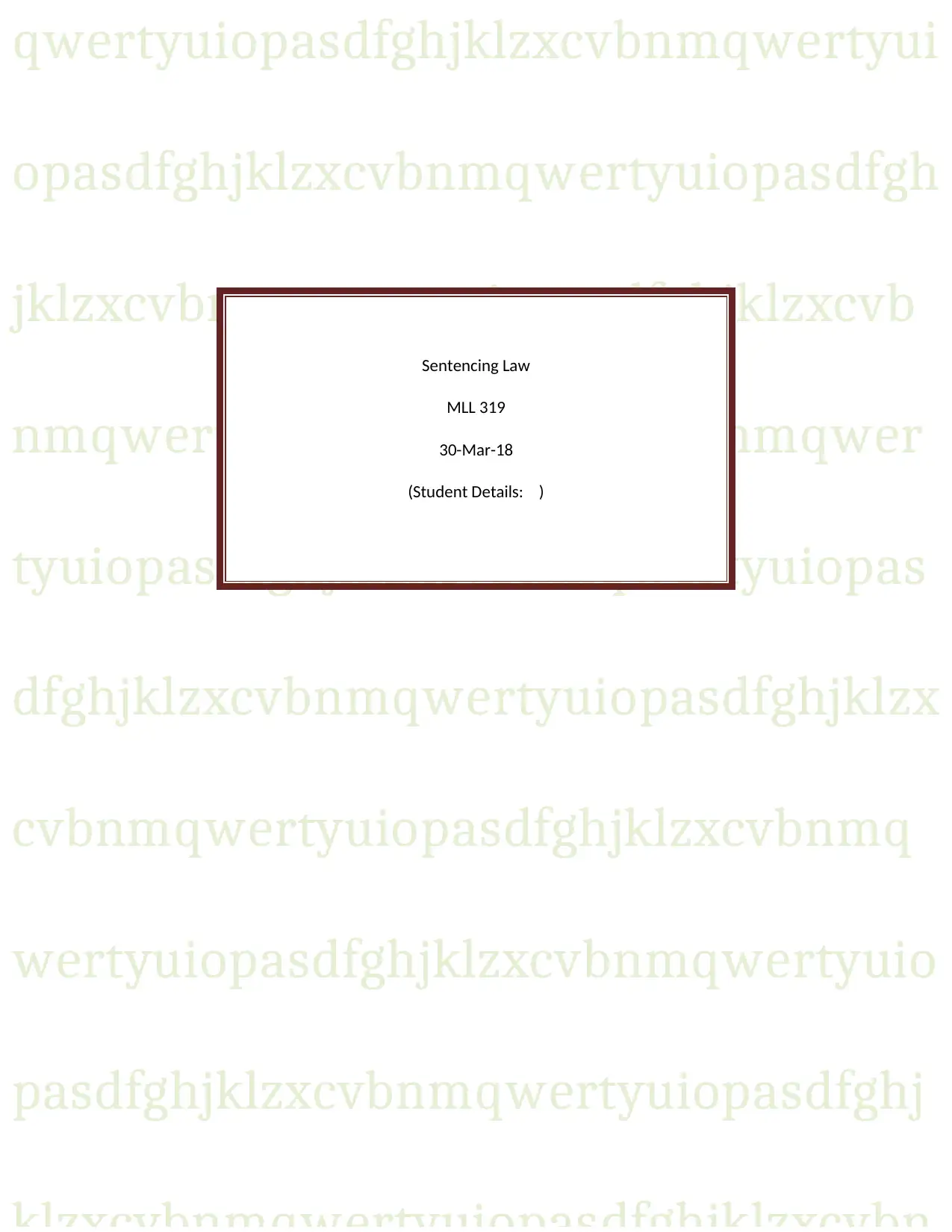
qwertyuiopasdfghjklzxcvbnmqwertyui
opasdfghjklzxcvbnmqwertyuiopasdfgh
jklzxcvbnmqwertyuiopasdfghjklzxcvb
nmqwertyuiopasdfghjklzxcvbnmqwer
tyuiopasdfghjklzxcvbnmqwertyuiopas
dfghjklzxcvbnmqwertyuiopasdfghjklzx
cvbnmqwertyuiopasdfghjklzxcvbnmq
wertyuiopasdfghjklzxcvbnmqwertyuio
pasdfghjklzxcvbnmqwertyuiopasdfghj
Sentencing Law
MLL 319
30-Mar-18
(Student Details: )
opasdfghjklzxcvbnmqwertyuiopasdfgh
jklzxcvbnmqwertyuiopasdfghjklzxcvb
nmqwertyuiopasdfghjklzxcvbnmqwer
tyuiopasdfghjklzxcvbnmqwertyuiopas
dfghjklzxcvbnmqwertyuiopasdfghjklzx
cvbnmqwertyuiopasdfghjklzxcvbnmq
wertyuiopasdfghjklzxcvbnmqwertyuio
pasdfghjklzxcvbnmqwertyuiopasdfghj
Sentencing Law
MLL 319
30-Mar-18
(Student Details: )
Paraphrase This Document
Need a fresh take? Get an instant paraphrase of this document with our AI Paraphraser
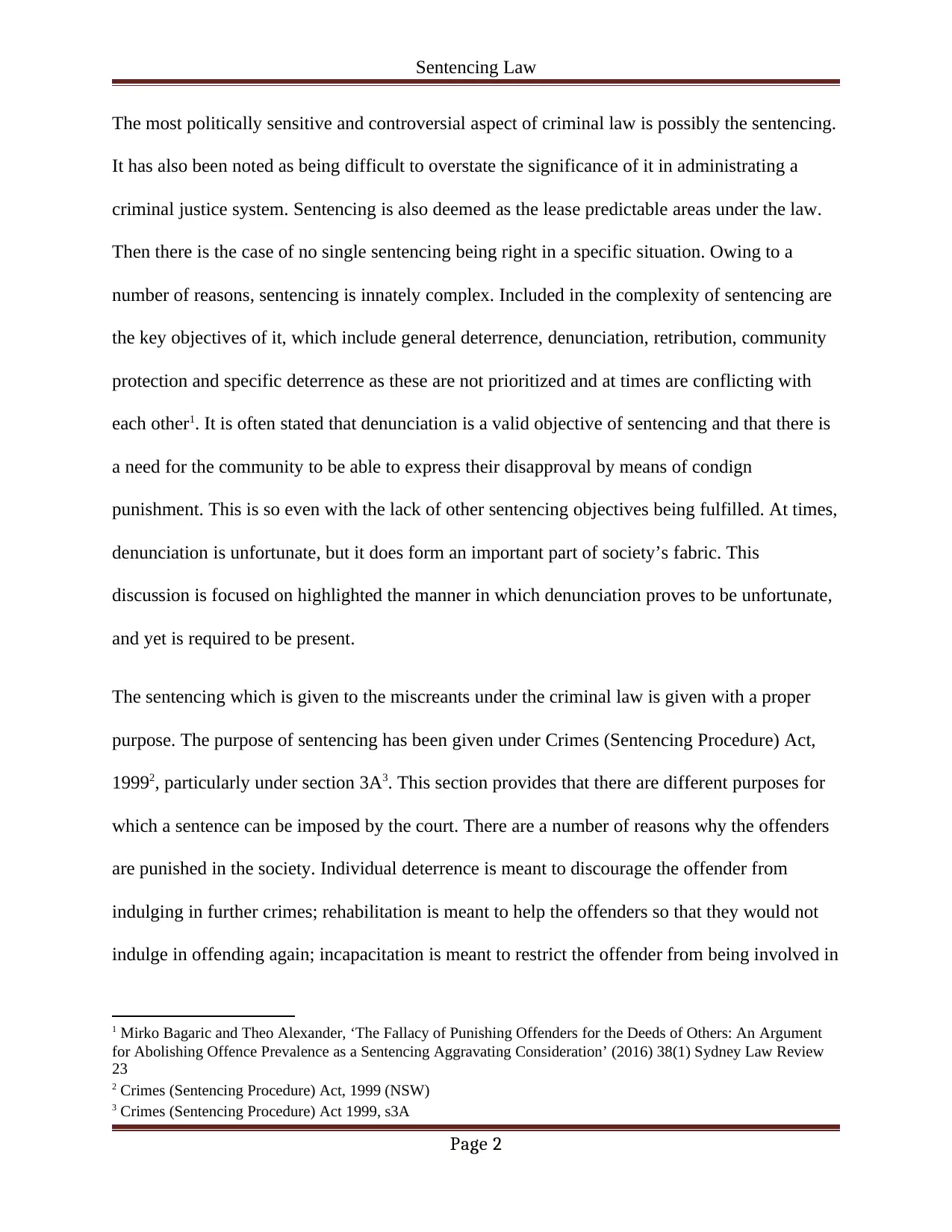
Sentencing Law
The most politically sensitive and controversial aspect of criminal law is possibly the sentencing.
It has also been noted as being difficult to overstate the significance of it in administrating a
criminal justice system. Sentencing is also deemed as the lease predictable areas under the law.
Then there is the case of no single sentencing being right in a specific situation. Owing to a
number of reasons, sentencing is innately complex. Included in the complexity of sentencing are
the key objectives of it, which include general deterrence, denunciation, retribution, community
protection and specific deterrence as these are not prioritized and at times are conflicting with
each other1. It is often stated that denunciation is a valid objective of sentencing and that there is
a need for the community to be able to express their disapproval by means of condign
punishment. This is so even with the lack of other sentencing objectives being fulfilled. At times,
denunciation is unfortunate, but it does form an important part of society’s fabric. This
discussion is focused on highlighted the manner in which denunciation proves to be unfortunate,
and yet is required to be present.
The sentencing which is given to the miscreants under the criminal law is given with a proper
purpose. The purpose of sentencing has been given under Crimes (Sentencing Procedure) Act,
19992, particularly under section 3A3. This section provides that there are different purposes for
which a sentence can be imposed by the court. There are a number of reasons why the offenders
are punished in the society. Individual deterrence is meant to discourage the offender from
indulging in further crimes; rehabilitation is meant to help the offenders so that they would not
indulge in offending again; incapacitation is meant to restrict the offender from being involved in
1 Mirko Bagaric and Theo Alexander, ‘The Fallacy of Punishing Offenders for the Deeds of Others: An Argument
for Abolishing Offence Prevalence as a Sentencing Aggravating Consideration’ (2016) 38(1) Sydney Law Review
23
2 Crimes (Sentencing Procedure) Act, 1999 (NSW)
3 Crimes (Sentencing Procedure) Act 1999, s3A
Page 2
The most politically sensitive and controversial aspect of criminal law is possibly the sentencing.
It has also been noted as being difficult to overstate the significance of it in administrating a
criminal justice system. Sentencing is also deemed as the lease predictable areas under the law.
Then there is the case of no single sentencing being right in a specific situation. Owing to a
number of reasons, sentencing is innately complex. Included in the complexity of sentencing are
the key objectives of it, which include general deterrence, denunciation, retribution, community
protection and specific deterrence as these are not prioritized and at times are conflicting with
each other1. It is often stated that denunciation is a valid objective of sentencing and that there is
a need for the community to be able to express their disapproval by means of condign
punishment. This is so even with the lack of other sentencing objectives being fulfilled. At times,
denunciation is unfortunate, but it does form an important part of society’s fabric. This
discussion is focused on highlighted the manner in which denunciation proves to be unfortunate,
and yet is required to be present.
The sentencing which is given to the miscreants under the criminal law is given with a proper
purpose. The purpose of sentencing has been given under Crimes (Sentencing Procedure) Act,
19992, particularly under section 3A3. This section provides that there are different purposes for
which a sentence can be imposed by the court. There are a number of reasons why the offenders
are punished in the society. Individual deterrence is meant to discourage the offender from
indulging in further crimes; rehabilitation is meant to help the offenders so that they would not
indulge in offending again; incapacitation is meant to restrict the offender from being involved in
1 Mirko Bagaric and Theo Alexander, ‘The Fallacy of Punishing Offenders for the Deeds of Others: An Argument
for Abolishing Offence Prevalence as a Sentencing Aggravating Consideration’ (2016) 38(1) Sydney Law Review
23
2 Crimes (Sentencing Procedure) Act, 1999 (NSW)
3 Crimes (Sentencing Procedure) Act 1999, s3A
Page 2
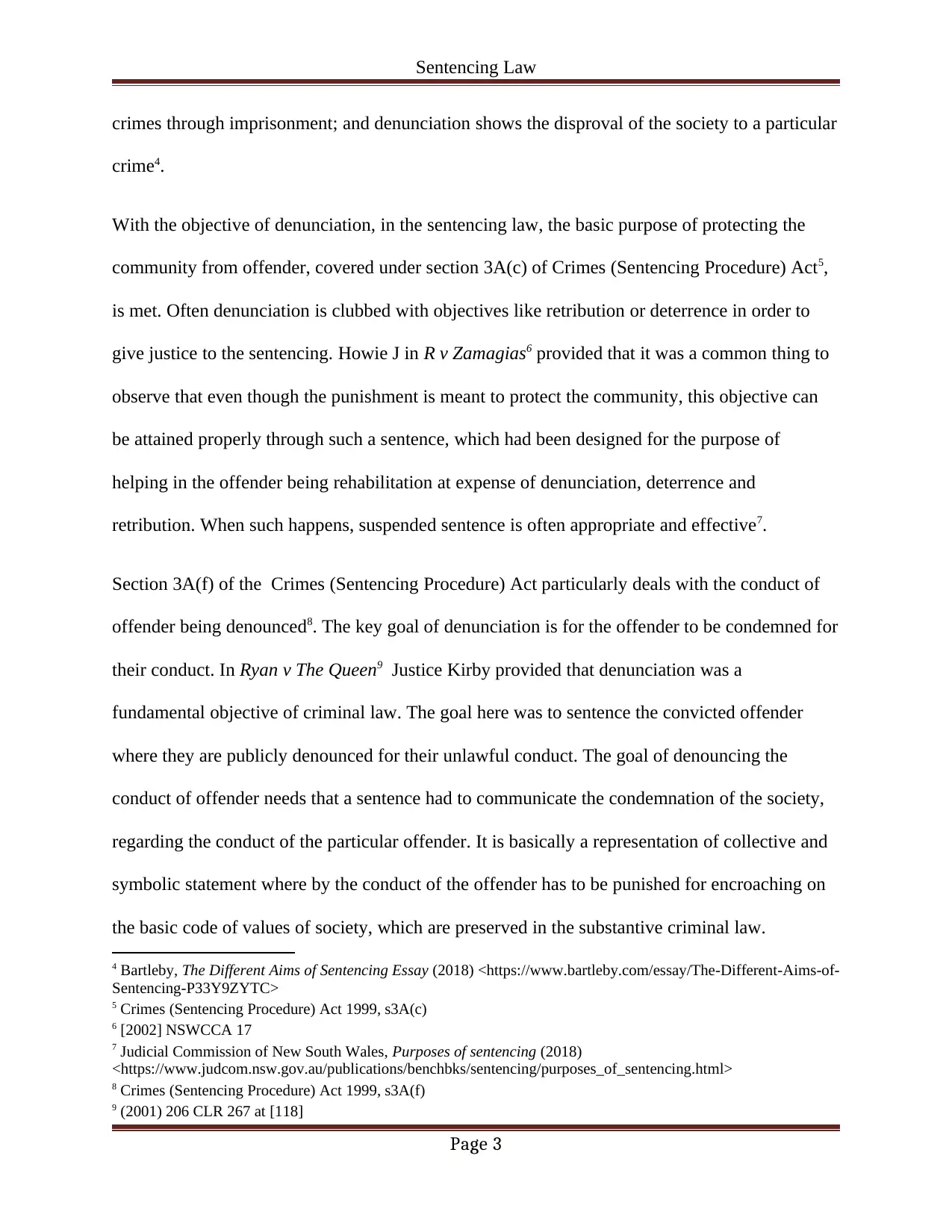
Sentencing Law
crimes through imprisonment; and denunciation shows the disproval of the society to a particular
crime4.
With the objective of denunciation, in the sentencing law, the basic purpose of protecting the
community from offender, covered under section 3A(c) of Crimes (Sentencing Procedure) Act5,
is met. Often denunciation is clubbed with objectives like retribution or deterrence in order to
give justice to the sentencing. Howie J in R v Zamagias6 provided that it was a common thing to
observe that even though the punishment is meant to protect the community, this objective can
be attained properly through such a sentence, which had been designed for the purpose of
helping in the offender being rehabilitation at expense of denunciation, deterrence and
retribution. When such happens, suspended sentence is often appropriate and effective7.
Section 3A(f) of the Crimes (Sentencing Procedure) Act particularly deals with the conduct of
offender being denounced8. The key goal of denunciation is for the offender to be condemned for
their conduct. In Ryan v The Queen9 Justice Kirby provided that denunciation was a
fundamental objective of criminal law. The goal here was to sentence the convicted offender
where they are publicly denounced for their unlawful conduct. The goal of denouncing the
conduct of offender needs that a sentence had to communicate the condemnation of the society,
regarding the conduct of the particular offender. It is basically a representation of collective and
symbolic statement where by the conduct of the offender has to be punished for encroaching on
the basic code of values of society, which are preserved in the substantive criminal law.
4 Bartleby, The Different Aims of Sentencing Essay (2018) <https://www.bartleby.com/essay/The-Different-Aims-of-
Sentencing-P33Y9ZYTC>
5 Crimes (Sentencing Procedure) Act 1999, s3A(c)
6 [2002] NSWCCA 17
7 Judicial Commission of New South Wales, Purposes of sentencing (2018)
<https://www.judcom.nsw.gov.au/publications/benchbks/sentencing/purposes_of_sentencing.html>
8 Crimes (Sentencing Procedure) Act 1999, s3A(f)
9 (2001) 206 CLR 267 at [118]
Page 3
crimes through imprisonment; and denunciation shows the disproval of the society to a particular
crime4.
With the objective of denunciation, in the sentencing law, the basic purpose of protecting the
community from offender, covered under section 3A(c) of Crimes (Sentencing Procedure) Act5,
is met. Often denunciation is clubbed with objectives like retribution or deterrence in order to
give justice to the sentencing. Howie J in R v Zamagias6 provided that it was a common thing to
observe that even though the punishment is meant to protect the community, this objective can
be attained properly through such a sentence, which had been designed for the purpose of
helping in the offender being rehabilitation at expense of denunciation, deterrence and
retribution. When such happens, suspended sentence is often appropriate and effective7.
Section 3A(f) of the Crimes (Sentencing Procedure) Act particularly deals with the conduct of
offender being denounced8. The key goal of denunciation is for the offender to be condemned for
their conduct. In Ryan v The Queen9 Justice Kirby provided that denunciation was a
fundamental objective of criminal law. The goal here was to sentence the convicted offender
where they are publicly denounced for their unlawful conduct. The goal of denouncing the
conduct of offender needs that a sentence had to communicate the condemnation of the society,
regarding the conduct of the particular offender. It is basically a representation of collective and
symbolic statement where by the conduct of the offender has to be punished for encroaching on
the basic code of values of society, which are preserved in the substantive criminal law.
4 Bartleby, The Different Aims of Sentencing Essay (2018) <https://www.bartleby.com/essay/The-Different-Aims-of-
Sentencing-P33Y9ZYTC>
5 Crimes (Sentencing Procedure) Act 1999, s3A(c)
6 [2002] NSWCCA 17
7 Judicial Commission of New South Wales, Purposes of sentencing (2018)
<https://www.judcom.nsw.gov.au/publications/benchbks/sentencing/purposes_of_sentencing.html>
8 Crimes (Sentencing Procedure) Act 1999, s3A(f)
9 (2001) 206 CLR 267 at [118]
Page 3
⊘ This is a preview!⊘
Do you want full access?
Subscribe today to unlock all pages.

Trusted by 1+ million students worldwide
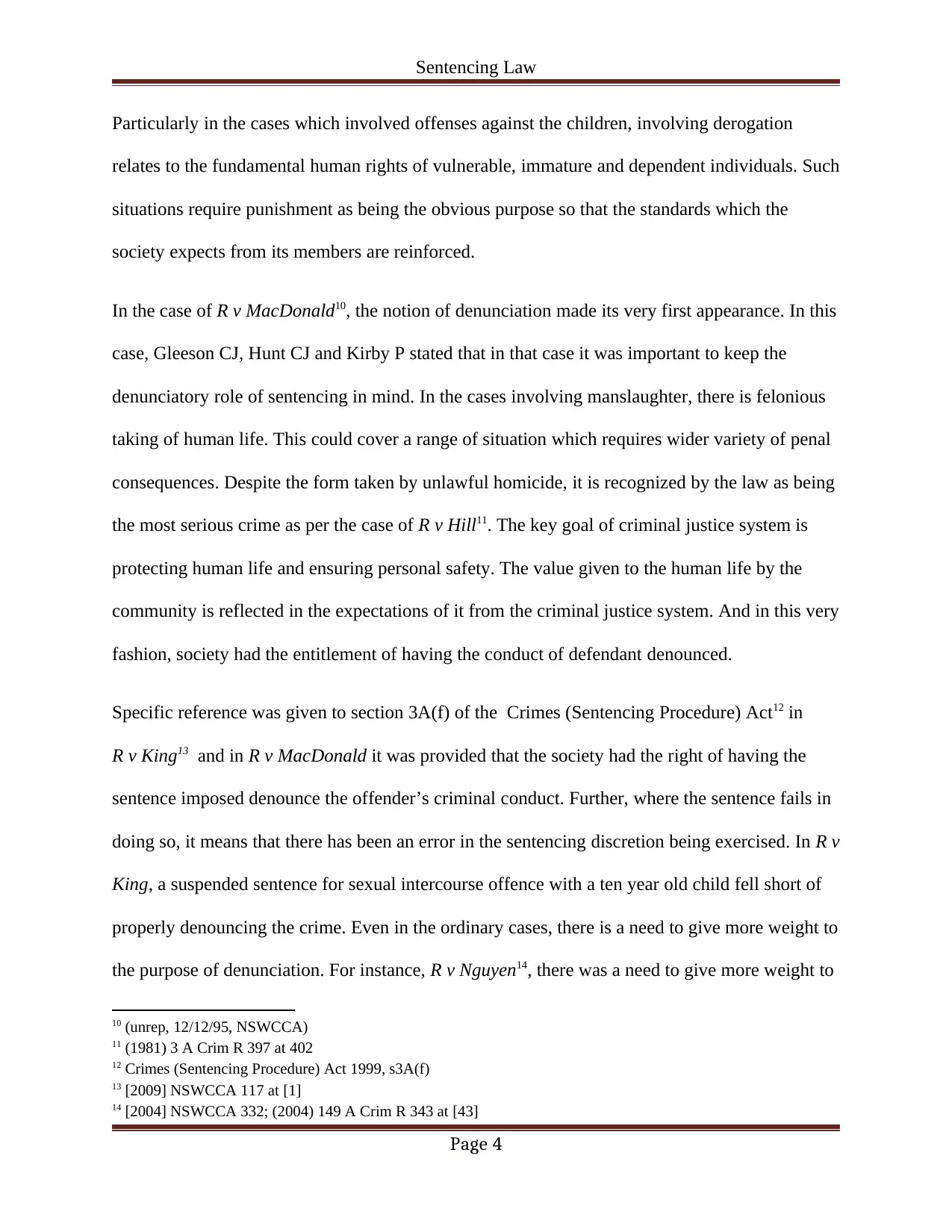
Sentencing Law
Particularly in the cases which involved offenses against the children, involving derogation
relates to the fundamental human rights of vulnerable, immature and dependent individuals. Such
situations require punishment as being the obvious purpose so that the standards which the
society expects from its members are reinforced.
In the case of R v MacDonald10, the notion of denunciation made its very first appearance. In this
case, Gleeson CJ, Hunt CJ and Kirby P stated that in that case it was important to keep the
denunciatory role of sentencing in mind. In the cases involving manslaughter, there is felonious
taking of human life. This could cover a range of situation which requires wider variety of penal
consequences. Despite the form taken by unlawful homicide, it is recognized by the law as being
the most serious crime as per the case of R v Hill11. The key goal of criminal justice system is
protecting human life and ensuring personal safety. The value given to the human life by the
community is reflected in the expectations of it from the criminal justice system. And in this very
fashion, society had the entitlement of having the conduct of defendant denounced.
Specific reference was given to section 3A(f) of the Crimes (Sentencing Procedure) Act12 in
R v King13 and in R v MacDonald it was provided that the society had the right of having the
sentence imposed denounce the offender’s criminal conduct. Further, where the sentence fails in
doing so, it means that there has been an error in the sentencing discretion being exercised. In R v
King, a suspended sentence for sexual intercourse offence with a ten year old child fell short of
properly denouncing the crime. Even in the ordinary cases, there is a need to give more weight to
the purpose of denunciation. For instance, R v Nguyen14, there was a need to give more weight to
10 (unrep, 12/12/95, NSWCCA)
11 (1981) 3 A Crim R 397 at 402
12 Crimes (Sentencing Procedure) Act 1999, s3A(f)
13 [2009] NSWCCA 117 at [1]
14 [2004] NSWCCA 332; (2004) 149 A Crim R 343 at [43]
Page 4
Particularly in the cases which involved offenses against the children, involving derogation
relates to the fundamental human rights of vulnerable, immature and dependent individuals. Such
situations require punishment as being the obvious purpose so that the standards which the
society expects from its members are reinforced.
In the case of R v MacDonald10, the notion of denunciation made its very first appearance. In this
case, Gleeson CJ, Hunt CJ and Kirby P stated that in that case it was important to keep the
denunciatory role of sentencing in mind. In the cases involving manslaughter, there is felonious
taking of human life. This could cover a range of situation which requires wider variety of penal
consequences. Despite the form taken by unlawful homicide, it is recognized by the law as being
the most serious crime as per the case of R v Hill11. The key goal of criminal justice system is
protecting human life and ensuring personal safety. The value given to the human life by the
community is reflected in the expectations of it from the criminal justice system. And in this very
fashion, society had the entitlement of having the conduct of defendant denounced.
Specific reference was given to section 3A(f) of the Crimes (Sentencing Procedure) Act12 in
R v King13 and in R v MacDonald it was provided that the society had the right of having the
sentence imposed denounce the offender’s criminal conduct. Further, where the sentence fails in
doing so, it means that there has been an error in the sentencing discretion being exercised. In R v
King, a suspended sentence for sexual intercourse offence with a ten year old child fell short of
properly denouncing the crime. Even in the ordinary cases, there is a need to give more weight to
the purpose of denunciation. For instance, R v Nguyen14, there was a need to give more weight to
10 (unrep, 12/12/95, NSWCCA)
11 (1981) 3 A Crim R 397 at 402
12 Crimes (Sentencing Procedure) Act 1999, s3A(f)
13 [2009] NSWCCA 117 at [1]
14 [2004] NSWCCA 332; (2004) 149 A Crim R 343 at [43]
Page 4
Paraphrase This Document
Need a fresh take? Get an instant paraphrase of this document with our AI Paraphraser
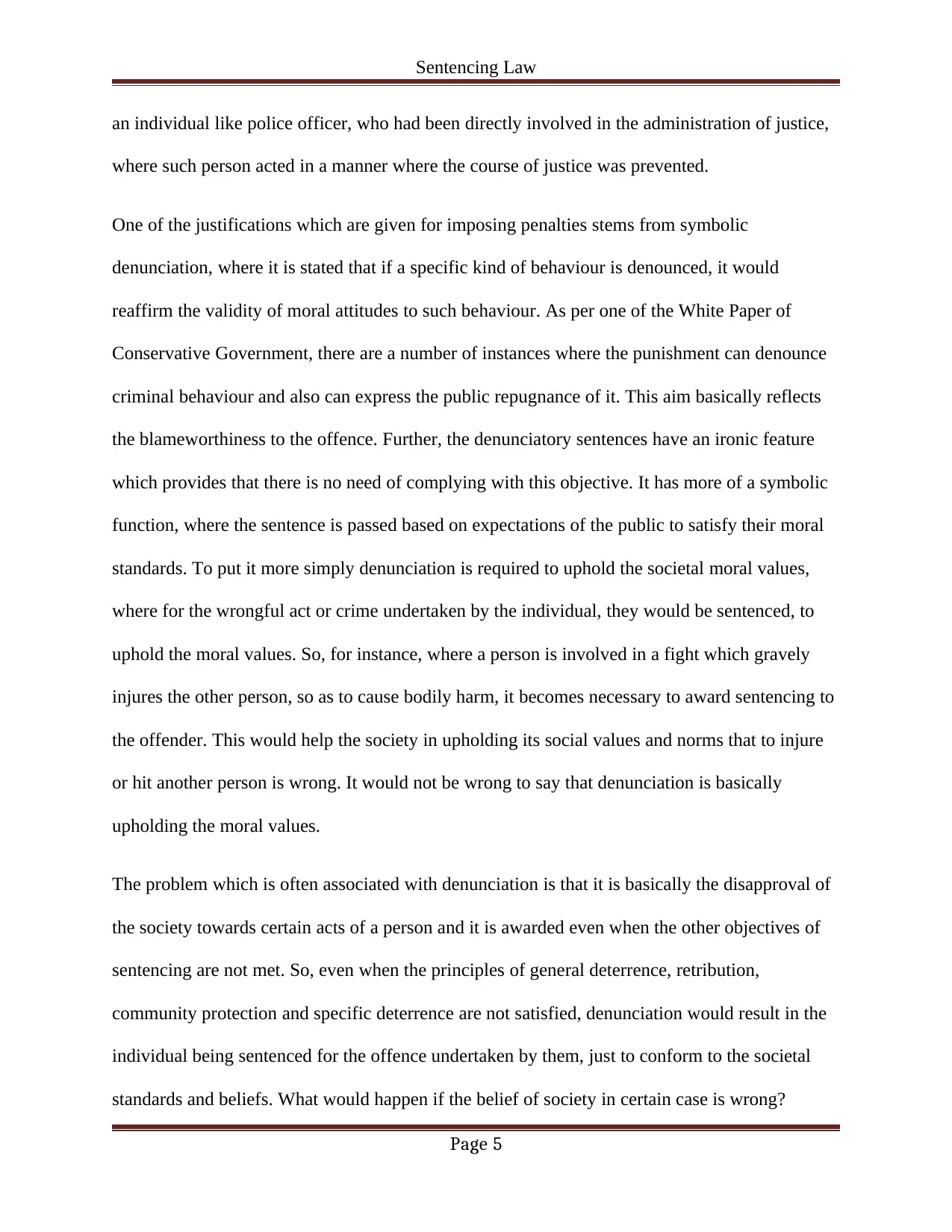
Sentencing Law
an individual like police officer, who had been directly involved in the administration of justice,
where such person acted in a manner where the course of justice was prevented.
One of the justifications which are given for imposing penalties stems from symbolic
denunciation, where it is stated that if a specific kind of behaviour is denounced, it would
reaffirm the validity of moral attitudes to such behaviour. As per one of the White Paper of
Conservative Government, there are a number of instances where the punishment can denounce
criminal behaviour and also can express the public repugnance of it. This aim basically reflects
the blameworthiness to the offence. Further, the denunciatory sentences have an ironic feature
which provides that there is no need of complying with this objective. It has more of a symbolic
function, where the sentence is passed based on expectations of the public to satisfy their moral
standards. To put it more simply denunciation is required to uphold the societal moral values,
where for the wrongful act or crime undertaken by the individual, they would be sentenced, to
uphold the moral values. So, for instance, where a person is involved in a fight which gravely
injures the other person, so as to cause bodily harm, it becomes necessary to award sentencing to
the offender. This would help the society in upholding its social values and norms that to injure
or hit another person is wrong. It would not be wrong to say that denunciation is basically
upholding the moral values.
The problem which is often associated with denunciation is that it is basically the disapproval of
the society towards certain acts of a person and it is awarded even when the other objectives of
sentencing are not met. So, even when the principles of general deterrence, retribution,
community protection and specific deterrence are not satisfied, denunciation would result in the
individual being sentenced for the offence undertaken by them, just to conform to the societal
standards and beliefs. What would happen if the belief of society in certain case is wrong?
Page 5
an individual like police officer, who had been directly involved in the administration of justice,
where such person acted in a manner where the course of justice was prevented.
One of the justifications which are given for imposing penalties stems from symbolic
denunciation, where it is stated that if a specific kind of behaviour is denounced, it would
reaffirm the validity of moral attitudes to such behaviour. As per one of the White Paper of
Conservative Government, there are a number of instances where the punishment can denounce
criminal behaviour and also can express the public repugnance of it. This aim basically reflects
the blameworthiness to the offence. Further, the denunciatory sentences have an ironic feature
which provides that there is no need of complying with this objective. It has more of a symbolic
function, where the sentence is passed based on expectations of the public to satisfy their moral
standards. To put it more simply denunciation is required to uphold the societal moral values,
where for the wrongful act or crime undertaken by the individual, they would be sentenced, to
uphold the moral values. So, for instance, where a person is involved in a fight which gravely
injures the other person, so as to cause bodily harm, it becomes necessary to award sentencing to
the offender. This would help the society in upholding its social values and norms that to injure
or hit another person is wrong. It would not be wrong to say that denunciation is basically
upholding the moral values.
The problem which is often associated with denunciation is that it is basically the disapproval of
the society towards certain acts of a person and it is awarded even when the other objectives of
sentencing are not met. So, even when the principles of general deterrence, retribution,
community protection and specific deterrence are not satisfied, denunciation would result in the
individual being sentenced for the offence undertaken by them, just to conform to the societal
standards and beliefs. What would happen if the belief of society in certain case is wrong?
Page 5
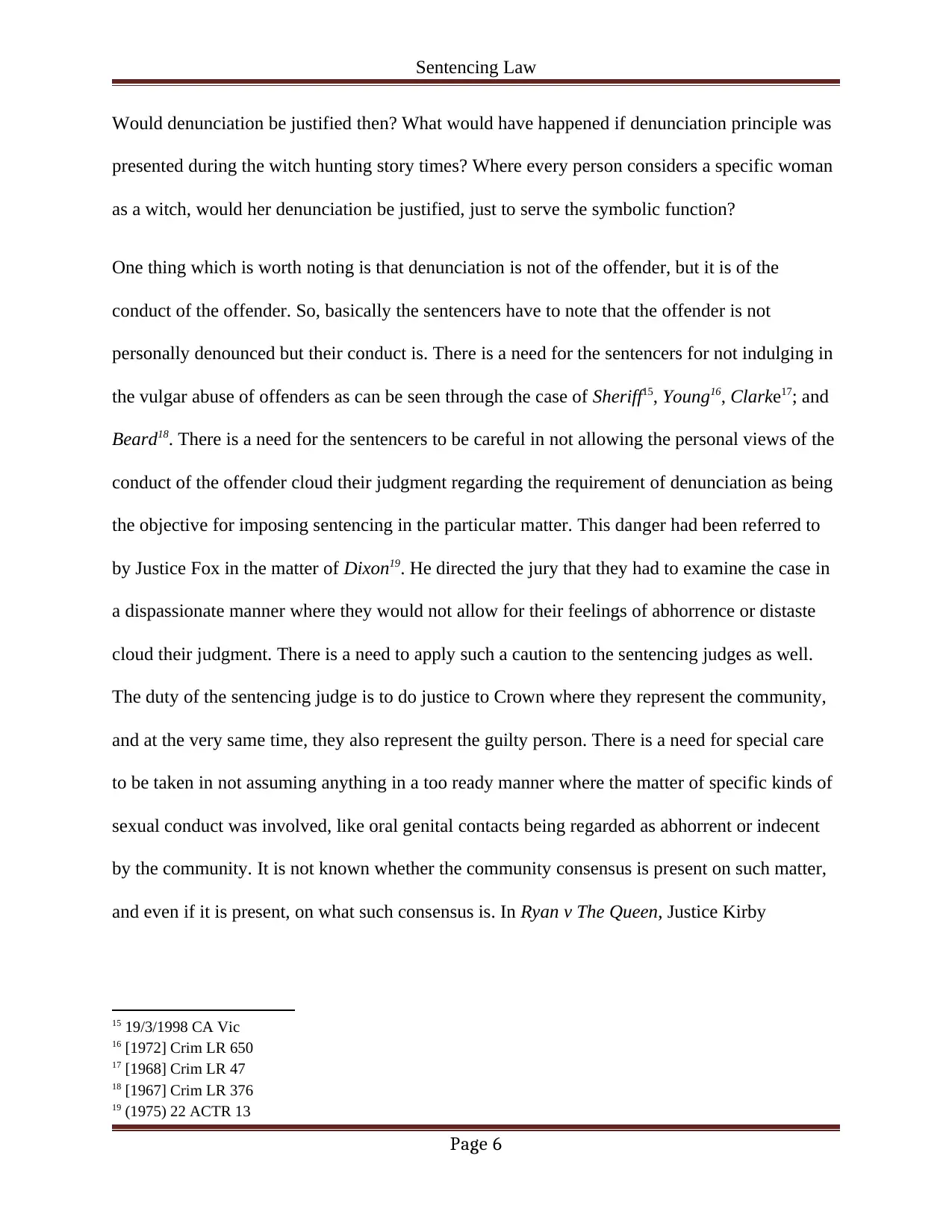
Sentencing Law
Would denunciation be justified then? What would have happened if denunciation principle was
presented during the witch hunting story times? Where every person considers a specific woman
as a witch, would her denunciation be justified, just to serve the symbolic function?
One thing which is worth noting is that denunciation is not of the offender, but it is of the
conduct of the offender. So, basically the sentencers have to note that the offender is not
personally denounced but their conduct is. There is a need for the sentencers for not indulging in
the vulgar abuse of offenders as can be seen through the case of Sheriff15, Young16, Clarke17; and
Beard18. There is a need for the sentencers to be careful in not allowing the personal views of the
conduct of the offender cloud their judgment regarding the requirement of denunciation as being
the objective for imposing sentencing in the particular matter. This danger had been referred to
by Justice Fox in the matter of Dixon19. He directed the jury that they had to examine the case in
a dispassionate manner where they would not allow for their feelings of abhorrence or distaste
cloud their judgment. There is a need to apply such a caution to the sentencing judges as well.
The duty of the sentencing judge is to do justice to Crown where they represent the community,
and at the very same time, they also represent the guilty person. There is a need for special care
to be taken in not assuming anything in a too ready manner where the matter of specific kinds of
sexual conduct was involved, like oral genital contacts being regarded as abhorrent or indecent
by the community. It is not known whether the community consensus is present on such matter,
and even if it is present, on what such consensus is. In Ryan v The Queen, Justice Kirby
15 19/3/1998 CA Vic
16 [1972] Crim LR 650
17 [1968] Crim LR 47
18 [1967] Crim LR 376
19 (1975) 22 ACTR 13
Page 6
Would denunciation be justified then? What would have happened if denunciation principle was
presented during the witch hunting story times? Where every person considers a specific woman
as a witch, would her denunciation be justified, just to serve the symbolic function?
One thing which is worth noting is that denunciation is not of the offender, but it is of the
conduct of the offender. So, basically the sentencers have to note that the offender is not
personally denounced but their conduct is. There is a need for the sentencers for not indulging in
the vulgar abuse of offenders as can be seen through the case of Sheriff15, Young16, Clarke17; and
Beard18. There is a need for the sentencers to be careful in not allowing the personal views of the
conduct of the offender cloud their judgment regarding the requirement of denunciation as being
the objective for imposing sentencing in the particular matter. This danger had been referred to
by Justice Fox in the matter of Dixon19. He directed the jury that they had to examine the case in
a dispassionate manner where they would not allow for their feelings of abhorrence or distaste
cloud their judgment. There is a need to apply such a caution to the sentencing judges as well.
The duty of the sentencing judge is to do justice to Crown where they represent the community,
and at the very same time, they also represent the guilty person. There is a need for special care
to be taken in not assuming anything in a too ready manner where the matter of specific kinds of
sexual conduct was involved, like oral genital contacts being regarded as abhorrent or indecent
by the community. It is not known whether the community consensus is present on such matter,
and even if it is present, on what such consensus is. In Ryan v The Queen, Justice Kirby
15 19/3/1998 CA Vic
16 [1972] Crim LR 650
17 [1968] Crim LR 47
18 [1967] Crim LR 376
19 (1975) 22 ACTR 13
Page 6
⊘ This is a preview!⊘
Do you want full access?
Subscribe today to unlock all pages.

Trusted by 1+ million students worldwide
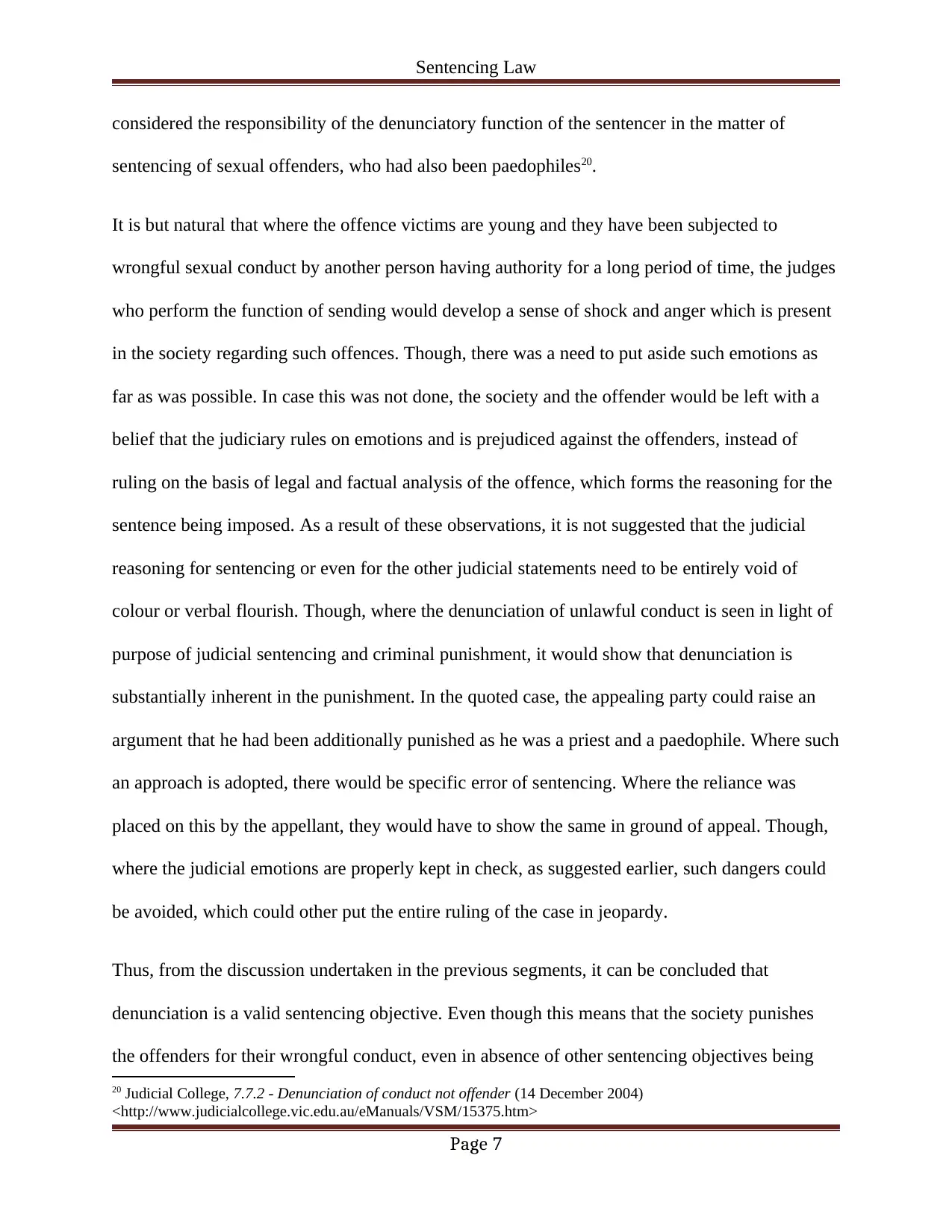
Sentencing Law
considered the responsibility of the denunciatory function of the sentencer in the matter of
sentencing of sexual offenders, who had also been paedophiles20.
It is but natural that where the offence victims are young and they have been subjected to
wrongful sexual conduct by another person having authority for a long period of time, the judges
who perform the function of sending would develop a sense of shock and anger which is present
in the society regarding such offences. Though, there was a need to put aside such emotions as
far as was possible. In case this was not done, the society and the offender would be left with a
belief that the judiciary rules on emotions and is prejudiced against the offenders, instead of
ruling on the basis of legal and factual analysis of the offence, which forms the reasoning for the
sentence being imposed. As a result of these observations, it is not suggested that the judicial
reasoning for sentencing or even for the other judicial statements need to be entirely void of
colour or verbal flourish. Though, where the denunciation of unlawful conduct is seen in light of
purpose of judicial sentencing and criminal punishment, it would show that denunciation is
substantially inherent in the punishment. In the quoted case, the appealing party could raise an
argument that he had been additionally punished as he was a priest and a paedophile. Where such
an approach is adopted, there would be specific error of sentencing. Where the reliance was
placed on this by the appellant, they would have to show the same in ground of appeal. Though,
where the judicial emotions are properly kept in check, as suggested earlier, such dangers could
be avoided, which could other put the entire ruling of the case in jeopardy.
Thus, from the discussion undertaken in the previous segments, it can be concluded that
denunciation is a valid sentencing objective. Even though this means that the society punishes
the offenders for their wrongful conduct, even in absence of other sentencing objectives being
20 Judicial College, 7.7.2 - Denunciation of conduct not offender (14 December 2004)
<http://www.judicialcollege.vic.edu.au/eManuals/VSM/15375.htm>
Page 7
considered the responsibility of the denunciatory function of the sentencer in the matter of
sentencing of sexual offenders, who had also been paedophiles20.
It is but natural that where the offence victims are young and they have been subjected to
wrongful sexual conduct by another person having authority for a long period of time, the judges
who perform the function of sending would develop a sense of shock and anger which is present
in the society regarding such offences. Though, there was a need to put aside such emotions as
far as was possible. In case this was not done, the society and the offender would be left with a
belief that the judiciary rules on emotions and is prejudiced against the offenders, instead of
ruling on the basis of legal and factual analysis of the offence, which forms the reasoning for the
sentence being imposed. As a result of these observations, it is not suggested that the judicial
reasoning for sentencing or even for the other judicial statements need to be entirely void of
colour or verbal flourish. Though, where the denunciation of unlawful conduct is seen in light of
purpose of judicial sentencing and criminal punishment, it would show that denunciation is
substantially inherent in the punishment. In the quoted case, the appealing party could raise an
argument that he had been additionally punished as he was a priest and a paedophile. Where such
an approach is adopted, there would be specific error of sentencing. Where the reliance was
placed on this by the appellant, they would have to show the same in ground of appeal. Though,
where the judicial emotions are properly kept in check, as suggested earlier, such dangers could
be avoided, which could other put the entire ruling of the case in jeopardy.
Thus, from the discussion undertaken in the previous segments, it can be concluded that
denunciation is a valid sentencing objective. Even though this means that the society punishes
the offenders for their wrongful conduct, even in absence of other sentencing objectives being
20 Judicial College, 7.7.2 - Denunciation of conduct not offender (14 December 2004)
<http://www.judicialcollege.vic.edu.au/eManuals/VSM/15375.htm>
Page 7
Paraphrase This Document
Need a fresh take? Get an instant paraphrase of this document with our AI Paraphraser
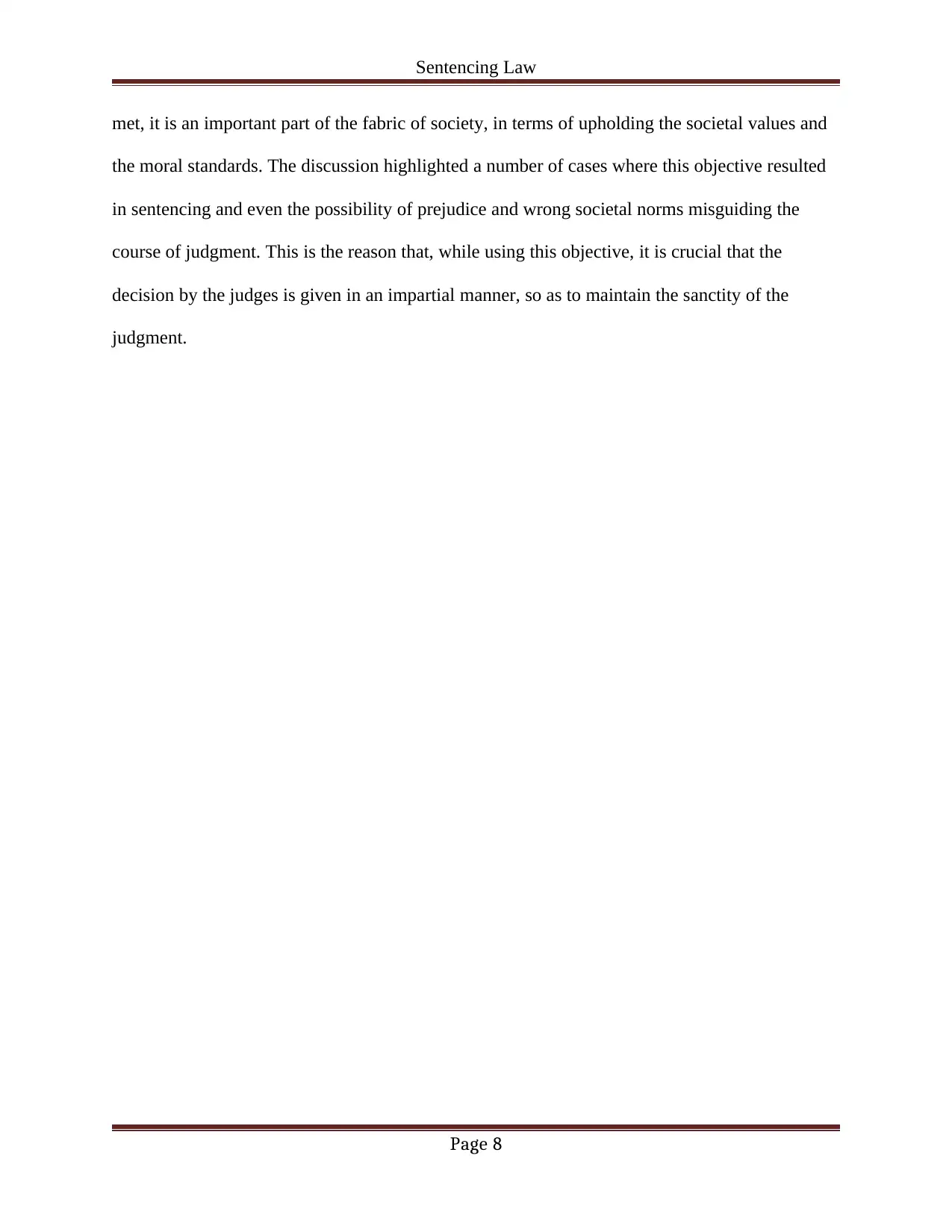
Sentencing Law
met, it is an important part of the fabric of society, in terms of upholding the societal values and
the moral standards. The discussion highlighted a number of cases where this objective resulted
in sentencing and even the possibility of prejudice and wrong societal norms misguiding the
course of judgment. This is the reason that, while using this objective, it is crucial that the
decision by the judges is given in an impartial manner, so as to maintain the sanctity of the
judgment.
Page 8
met, it is an important part of the fabric of society, in terms of upholding the societal values and
the moral standards. The discussion highlighted a number of cases where this objective resulted
in sentencing and even the possibility of prejudice and wrong societal norms misguiding the
course of judgment. This is the reason that, while using this objective, it is crucial that the
decision by the judges is given in an impartial manner, so as to maintain the sanctity of the
judgment.
Page 8
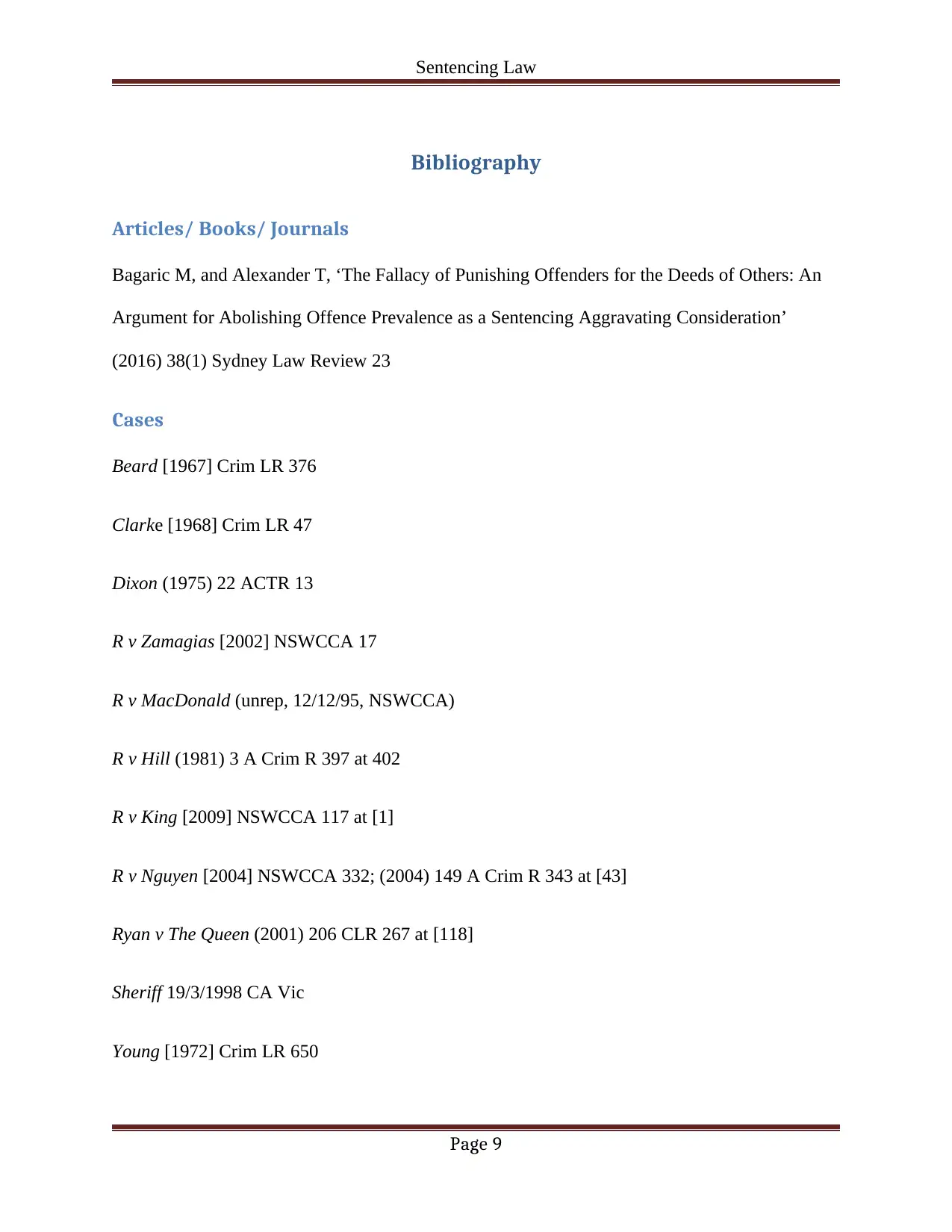
Sentencing Law
Bibliography
Articles/ Books/ Journals
Bagaric M, and Alexander T, ‘The Fallacy of Punishing Offenders for the Deeds of Others: An
Argument for Abolishing Offence Prevalence as a Sentencing Aggravating Consideration’
(2016) 38(1) Sydney Law Review 23
Cases
Beard [1967] Crim LR 376
Clarke [1968] Crim LR 47
Dixon (1975) 22 ACTR 13
R v Zamagias [2002] NSWCCA 17
R v MacDonald (unrep, 12/12/95, NSWCCA)
R v Hill (1981) 3 A Crim R 397 at 402
R v King [2009] NSWCCA 117 at [1]
R v Nguyen [2004] NSWCCA 332; (2004) 149 A Crim R 343 at [43]
Ryan v The Queen (2001) 206 CLR 267 at [118]
Sheriff 19/3/1998 CA Vic
Young [1972] Crim LR 650
Page 9
Bibliography
Articles/ Books/ Journals
Bagaric M, and Alexander T, ‘The Fallacy of Punishing Offenders for the Deeds of Others: An
Argument for Abolishing Offence Prevalence as a Sentencing Aggravating Consideration’
(2016) 38(1) Sydney Law Review 23
Cases
Beard [1967] Crim LR 376
Clarke [1968] Crim LR 47
Dixon (1975) 22 ACTR 13
R v Zamagias [2002] NSWCCA 17
R v MacDonald (unrep, 12/12/95, NSWCCA)
R v Hill (1981) 3 A Crim R 397 at 402
R v King [2009] NSWCCA 117 at [1]
R v Nguyen [2004] NSWCCA 332; (2004) 149 A Crim R 343 at [43]
Ryan v The Queen (2001) 206 CLR 267 at [118]
Sheriff 19/3/1998 CA Vic
Young [1972] Crim LR 650
Page 9
⊘ This is a preview!⊘
Do you want full access?
Subscribe today to unlock all pages.

Trusted by 1+ million students worldwide
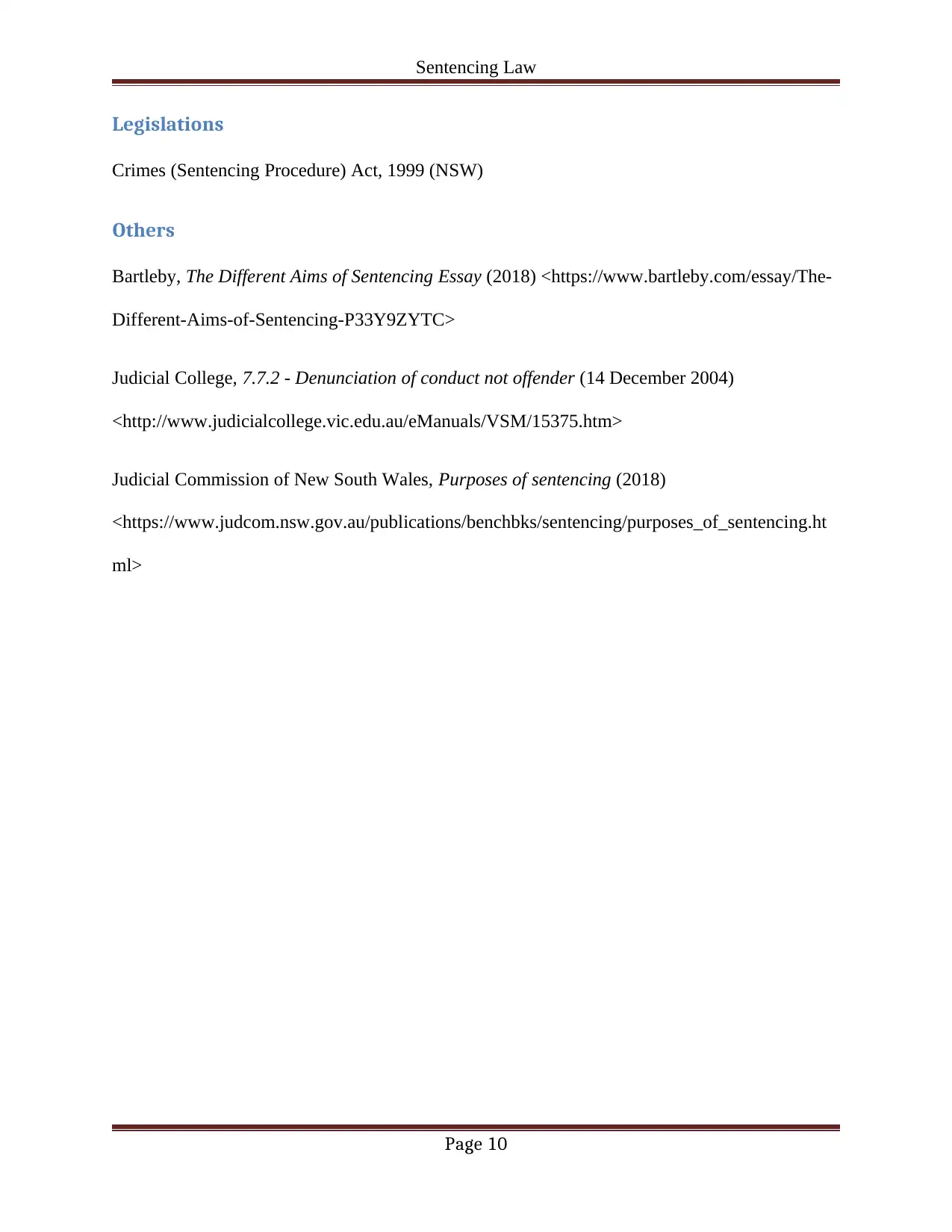
Sentencing Law
Legislations
Crimes (Sentencing Procedure) Act, 1999 (NSW)
Others
Bartleby, The Different Aims of Sentencing Essay (2018) <https://www.bartleby.com/essay/The-
Different-Aims-of-Sentencing-P33Y9ZYTC>
Judicial College, 7.7.2 - Denunciation of conduct not offender (14 December 2004)
<http://www.judicialcollege.vic.edu.au/eManuals/VSM/15375.htm>
Judicial Commission of New South Wales, Purposes of sentencing (2018)
<https://www.judcom.nsw.gov.au/publications/benchbks/sentencing/purposes_of_sentencing.ht
ml>
Page 10
Legislations
Crimes (Sentencing Procedure) Act, 1999 (NSW)
Others
Bartleby, The Different Aims of Sentencing Essay (2018) <https://www.bartleby.com/essay/The-
Different-Aims-of-Sentencing-P33Y9ZYTC>
Judicial College, 7.7.2 - Denunciation of conduct not offender (14 December 2004)
<http://www.judicialcollege.vic.edu.au/eManuals/VSM/15375.htm>
Judicial Commission of New South Wales, Purposes of sentencing (2018)
<https://www.judcom.nsw.gov.au/publications/benchbks/sentencing/purposes_of_sentencing.ht
ml>
Page 10
1 out of 10
Related Documents
Your All-in-One AI-Powered Toolkit for Academic Success.
+13062052269
info@desklib.com
Available 24*7 on WhatsApp / Email
![[object Object]](/_next/static/media/star-bottom.7253800d.svg)
Unlock your academic potential
Copyright © 2020–2026 A2Z Services. All Rights Reserved. Developed and managed by ZUCOL.





